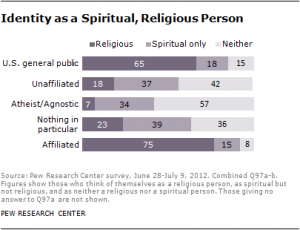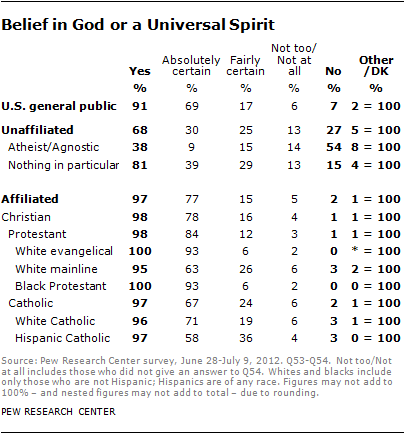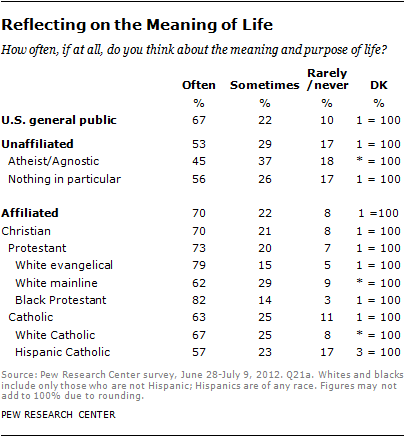The weekly report on research and demographics of the secular movement
by Julie Esris
Recently, The Atheist ExperienceÔÇÖs Matt Dillahunty appeared in a YouTube video to relate his story of deconversion from Christianity to atheism to a group of non-believers and skeptics. DillahuntyÔÇÖs story is a fascinating one. He was brought up in a religious Southern Baptist household and eventually was preparing to go to seminary in order to become a minister. That changed, however, when he started to closely examine his beliefs. Deciding he cared more about conclusions based on evidence than what he wished to be true, Dillahunty eventually realized that there was not enough evidence to justify his Christian beliefs, and ultimately became an atheist.
While Matt DillahuntyÔÇÖs story reflects a great deal of analysis and reflection, not everybody who calls themselves an atheist arrives at this conclusion in the same way. In fact, a 2012 Pew research study reveals┬áthat some self-professed atheists claim to believe in God, and some people who identify with a religion say that they do not believe in God. Of those surveyed, 14% of atheists claimed to believe in a universal spirit; it includes 5% who are ÔÇ£absolutely certainÔÇØ that there is a god; 3% even consider themselves religious! 26% of atheists think of themselves as spiritual, and 41% say that they often consider the meaning of life.

Predictably, however, this is still in stark contrast to the self-identified religious individuals who believe in God. 38% of self-professed atheists claim to believe in God, as opposed to 97% of the religiously affiliated. 100% of white evangelical Christians and 100% of black Protestants surveyed believe in God, whereas 95% of white mainline Protestants, 97% of Hispanic Catholics, and 96% of white Catholics hold the same belief. All groups surveyed believe in God to varying degrees of certainty: 9% of atheists, 93% of white evangelical Protestants, 63% of white mainline Protestants, 93% of black protestants, 71% of white Catholics, and 58% of Hispanic Catholics are ÔÇ£absolutely certainÔÇØ that there is a god.

Why any atheists profess to believe in God is a mystery, since lack of belief in God is implicit in the term ÔÇ£atheistÔÇØ. LetÔÇÖs return to Matt DillahuntyÔÇÖs story about how he became an atheist. He carefully considered the information and how likely it was for certain supernatural beliefs to be true. He did not become an atheist because of something traumatic in his past that made him bitterly declare that God couldnÔÇÖt be real. Nor did he become an atheist due to a dislike of organized religion. There are other people, however, who become atheistsÔÇöor who at least leave religionÔÇöbecause of bad experiences, because they dislike the teachings, or because they do not like organized religion. Such reasons only reflect the individualÔÇÖs opinion of religion, not whether or not they believe in God, or even any supernatural phenomenon. These reasons certainly have nothing to do with whether or not a god or any supernatural entity exists. Hypothetically, God could exist but be a sadistic tyrant, not the loving, forgiving God espoused by many Christians. It is all but clich├® in atheist circles to say that people who profess belief in God do so unthinkingly, but many people profess atheism just as unthinkingly.
It is possible that some people misuse the term ÔÇ£atheistÔÇØ to identify themselves as someone who is against organized religion. After all, one can dislike religion but still believe in a higher power. Conversely, a cursory examination of peopleÔÇÖs answers in the ÔÇ£religious viewsÔÇØ category on FacebookÔÇöChristian, Catholic, Jewish, etc.ÔÇömay reflect their cultural heritage or identity, not necessarily beliefs in religious doctrine. What is clear is that many people are espousing labels without thinking about why. A self-professed Catholic on Facebook may only be making a statement of his heritage; a self-professed atheist may only be declaring his disdain for religion.
It is important when conducting these surveys to remind respondents to define their terms: What do they mean by ÔÇ£atheistÔÇØ? What do they mean by ÔÇ£GodÔÇØ? What does it mean that oneÔÇÖs religious views are ÔÇ£JewishÔÇØ? If someone claims to belong to a religion, do they only mean that their recent ancestors practiced that religion, or that they actually believe in the doctrine? What does one mean when he says, ÔÇ£I am religiousÔÇØ or “I am spiritual”? Are some of these terms too nebulous to define? In terms of recent deconverts, how did they arrive at atheism? Through bad experiences, or through rational analysis, like Matt Dillahunty?
A more precise study, with these questions in mind, is needed.
